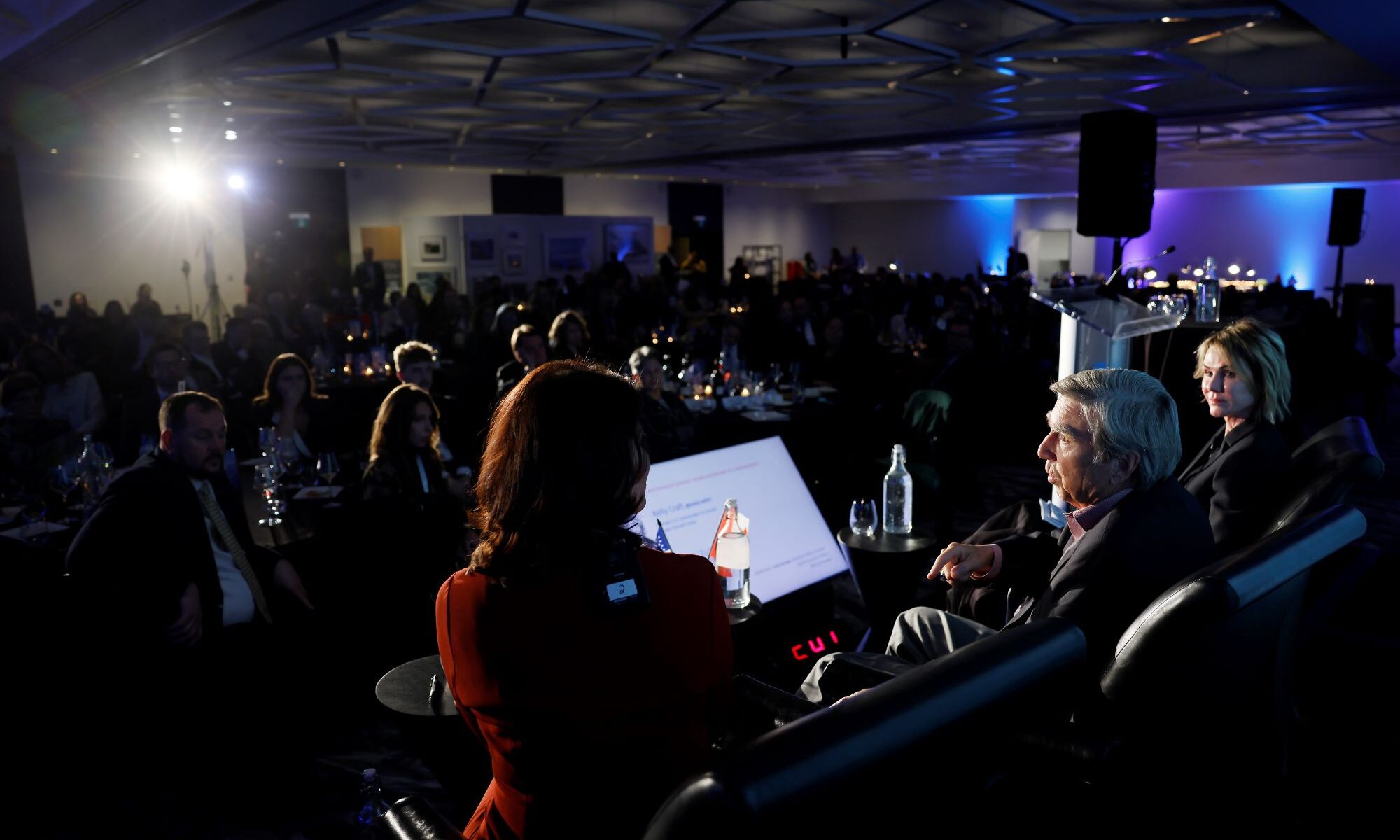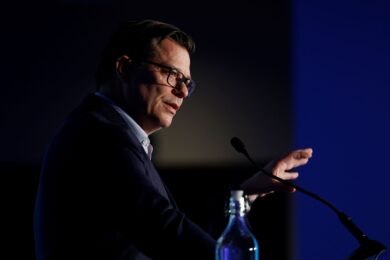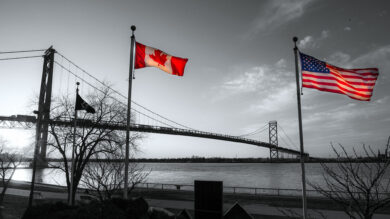
Five key takeaways from the Fall Lecture on Canada-U.S. relations
On the eve of a hugely consequential U.S. election, PPF’s Fall Lecture delved into the Canada-U.S. relationship — the challenges (like defence spending), the opportunities (like critical minerals) and the problems on the horizon (like trade and tariffs).
A sold-out room of policy wonks, business leaders and bureaucrats heard from Clifford Young, President of Polling and Societal Trends at Ipsos, about the big trends driving U.S. politics. Two former U.S. ambassadors to Canada, Republican Kelly Craft and Democrat Gordon Giffin, discussed what America wants (and needs) from Canada. And Edward Greenspon and Janice Stein, authors of the PPF’s recent Matter More report along with Drew Fagan, discussed how Canada can deal with an increasingly unpredictable America.
Here are five takeaways from the evening.
1. How do Americans really feel? Poor.
One trend that Ipsos sees in polling across the world, explained Clifford Young, “is the broad and wide-based belief that the system is broken, that the system no longer works for the average person, that the system is rigged, that parties and politicians no longer care about the average person like me.”
No surprise, then, that a dominant issue in America today is inflation. “What is the main issue facing the population today? Inflation, inflation, inflation. Who’s strongest on the main issue at the national level and in the swing states, Donald Trump, Donald Trump, Donald Trump.”
“I believe the administration and elites more generally, who do not have a problem with disposable income, even though inflation can be high, did not understand the plight of the average American, and the plight of the average American was dire,” said Young. “They had problems making ends meet. They had problems organizing and executing the household finances. And they still are in a state.”
Trump’s campaign in swing states is focused and on message, said Young. For Harris, it’s a challenge. “She’s part of the administration. They were running the country when inflation spiked. So they’ve tried to be coy about it.”
2. Canada needs to get serious about defence
“The world is on fire,” said Kelly Craft, who served as U.S. Ambassador to Canada from October 2017 until 2019. “Thank goodness we have a neighbourhood, right? Your neighbourhood matters. And I think everyone needs to take a step back and think about this neighbourhood. You look at Russia, Ukraine, how about that neighbourhood? So it is a sense of urgency, and the way that Canada can have relevance, and I’m going to say this, as I said this years ago, is to pay their 2 percent for NATO, to step up, be part of NATO.”
Gordon Giffin, U.S. Ambassador to Canada from August 1997 to 2001, agreed that Canada needs to do more on defence and “defend our common interests globally.”
“Paul Martin once said to me, ‘Gordon, stop.’ He said, ‘If you live next to the United States, you wouldn’t spend any money on defence either.’ And I said, ‘Well, you know, I sort of get the logic of that, sure, but you shouldn’t have said that to me.'”
3. It’s time to invest more in the Arctic
“If we’re going to make a major investment — and the government has said they’re going to ramp up spending, not quite, I think, to the 2 percent (of GDP) — why not focus it on the Indo Pacific, or why not focus it on NATO’s eastern flank?” asked Janice Stein, the Founding Director of the Munk School of Global Affairs & Public Policy. “Because we will have a much bigger impact in what we spend in the Arctic and the United States will count that spending as part of our 2 percent commitment. We will not have the same impact in the Indo Pacific, and they won’t count (it toward the 2 percent target).
Craft noted the astounding amount of Chinese investment and interest in the Arctic, despite it not even being an Arctic nation. The pressure is on Canada to get moving, and it’s an area America would appreciate more Canadian involvement.
4. Critical minerals are key
“China controls more than 80 percent of the critical mineral trade and processing in the world,” said PPF President and CEO Edward Greenspon. “That’s twice what OPEC controlled of oil at its height and so Western countries, the friends, are going to have to get together and become less dependent. Canada happens to be one of the great storehouses in the world of minerals. And we need to have a North America approach.”
Gordon Giffin also noted the need for more collaboration and deepening of ties in this area. “We’re doing some trial projects, if you will, now where there’s real collaboration going on with respect to critical minerals of U.S. investment in the development of Canadian assets.”
5. Think geopolitical not transactional
The Canada-U.S. relationship needs to be geopolitical not transactional, stressed Giffin. “There are multiple ways to be relevant to the United States, but one of them is not telling us how much Kleenex you sell to us.” What should Canada do? “I’d be a global partner with the United States on the principles and values that we agree on.”
And on trade: “I think we have to look at free trade in a different matrix.” By that he means a deeper relationship.
Craft added that CUSMA will be “reviewed” in 2026, a preferable word to “renegotiated.”
Bonus takeaway: Who’s going to win the U.S. election? National polls seem seem to be trending toward Trump
“ever so slightly,” said Young. Moderator Luiza Savage’s informal poll of the room seemed to give the edge to those who think Trump will win.
Importantly, Young said that Ipsos polling finds that “a vast majority of Americans — a super majority of Americans — say they would accept the (election) results.”




